Online colleges in Indiana are abundant because the state is highly committed to establishing one of the best higher education systems in the country.

One way the state has been doing this is through the Indiana Commission for Higher Education (ICHE). The ICHE is a public body created to coordinate and define missions for the state’s colleges and universities.
The ICHE released a plan to help improve schools over the next decade and beyond. Specifically, schools are challenged to double the number of degrees and certificates awarded and increase higher education attainment for adults to 60% by 2025.
Editorial Listing ShortCode:
The ICHE continues to facilitate the state’s progress by providing actionable and meaningful statistics on postsecondary education outcomes.
Online Colleges in Indiana

Indiana has long been at the forefront of online education. The Indiana College Network (ICN) was launched to help create and sustain “a single coordinated system of distance learning for Indiana’s citizens.”
At that time of establishment, the nation had already seen Indiana colleges going online and jumping ahead of the rest of the country when it came to distance education. Indiana’s colleges and universities were already offering 15 distance degree programs and well over 100 distance courses per year.
Editorial Listing ShortCode:
The ICN provides access to degree programs and courses at the state’s public and private institutions, as well as a host of resources to help with enrollment, financial aid, and career placement.
ICN’s online catalog currently includes more than 200 distance certificate and degree programs and 3,000 distance college courses.
According to National Center for Education Statistics (NCES), almost 25% of students in Indiana are enrolled in degree programs at accredited online colleges. An additional 24% are enrolled in one or more online courses.
These numbers continue to rise as students recognize the value and flexibility that distance learning can offer.
Common Online Degrees in Indiana

Online universities in Indiana offer an array of different degrees. These are some of the most popular programs:
- Computer networking: This degree typically focuses on topics like programming languages and cybersecurity. It can help prepare you for a career as a network administrator, computer systems analyst, or network support specialist.
- Nursing: Earning a nursing degree can give you the opportunity to learn how to provide care to patients in different healthcare settings. Depending on the degree level you pursue, you might go on to become a vocational nurse, a registered nurse, or a nurse practitioner.
- Psychology: Psychology involves the study of human behavior, including mental health disorders. This degree can help prepare you for a career as a counselor, a therapist, or a psychologist.
- Business administration and management: A business administration and management program can help you develop useful leadership skills, such as critical thinking, analysis, and communication, and learn how to navigate complex situations and meet organizational goals.
- Accounting: An accounting program can help you learn how to gather, interpret, and analyze financial data. With an accounting degree, you may pursue a career as an accountant, a budget analyst, or a financial manager.
These degrees represent only a few of the options available to students pursuing their academic dreams through the best online colleges in Indiana.
Overview of Higher Education in Indiana

In Indiana, there are 66 degree-granting institutions, according to the National Center for Education Statistics. Of those, 16 are public schools, while 40 are private non-profit and 10 are private for-profit.
Indiana is home to several high-ranking, world-renowned schools. To attend one of the state’s public 4-year schools, the NCES reports that tuition and fees cost on average $9,656 a year for in-state students, which is very close to the national average. The cost per year for out-of-state students is on average $28,972 a year.
The out-of-state costs may be lower for residents of nearby Midwestern states, though. Indiana is a member of the Midwest Student Exchange Program (MSEP), which allows qualifying students to enroll at public universities within the 9 participating states for no more than 150% of the in-state tuition rate.
This can open the door to a greater selection of degree programs and courses, particularly for online students.
Employment Outlook for College Graduates in Indiana

Indiana offers career opportunities to college graduates in many different fields. According to the U.S. Bureau of Labor Statistics (BLS), more than 2.9 million people work in Indiana, particularly in industries like production, transportation, and sales.
Although careers in these areas often don’t require college degrees, if you hope to advance to a supervisory or management position, a degree may strengthen your qualifications. Other growing industries in Indiana include healthcare, education, finance, and management.
Editorial Listing ShortCode:
Indiana’s unemployment rate tends to be low, generally ranging between 3 and 3.2%. This rate is slightly below the national average, which suggests that the job market in the state is currently strong.
The median annual wage in Indiana is $38,330, which is lower than the national median wage of $45,760.
Careers & Salaries in Indiana
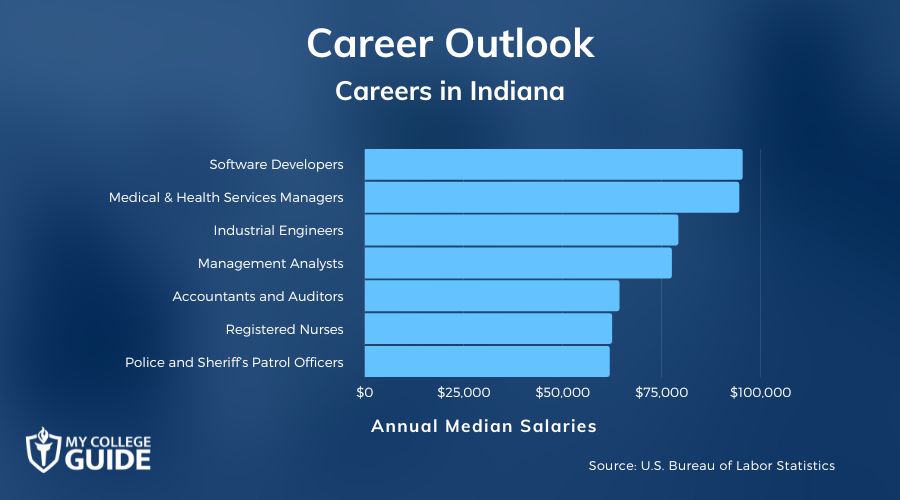
College graduates in Indiana work in a variety of industries, including healthcare, business, law enforcement, and education. Many of the positions in these areas require a minimum of a bachelor’s degree.
Organizations often pay larger salaries to candidates who have higher education than those who hold high school diplomas. A college degree may also give you a broader pool of options in terms of employers.
After earning your degree, you may be better positioned to seek employment with a private business, government agency, healthcare facility, financial institution, or school.
According to the Bureau of Labor Statistics, these are some common careers in Indiana and their average yearly salaries.
| Careers | Annual Median Salaries |
| Software Developers | $95,370 |
| Medical and Health Services Managers | $94,520 |
| Industrial Engineers | $79,140 |
| Management Analysts | $77,500 |
| Accountants and Auditors | $64,270 |
| Registered Nurses | $62,400 |
| Police and Sheriff’s Patrol Officers | $61,800 |
| Human Resources Specialists | $50,110 |
| Licensed Practical and Licensed Vocational Nurses | $48,070 |
| Bookkeeping, Accounting, and Auditing Clerks | $38,210 |
These are just some of the careers that may be available in Indiana. The earning of a degree does not guarantee job availability or a specific salary. Careers and salaries specifically available to you will depend on your geographic location, work experience, education, and other factors.
How to Know If an Online Degree Is Right for Me

Online degrees are a great fit for many students, but they’re not right for everyone. When considering an online degree, these are some factors you may want to consider:
- Level of difficulty: Online courses are generally equally as difficult as in-person classes, but they also require self-discipline and time management skills.
- Technology access: To succeed in an online degree program, you will need consistent access to a computer and a reliable internet connection.
- Social interactions: If you are interested in extracurricular activities or in-person meetings with your classmates and instructors, an online course may not be the best fit.
- Flexibility: Many online degree programs will allow you to study wherever and whenever works best for you, which may make these programs ideal if you have a full-time job or family obligations that conflict with in-person course schedules.
These are just some of the factors to consider. Whether you decide to study online or on-campus, each program will have various aspects to consider.
Pros and Cons of Online Degrees
Indiana online degrees offer benefits and drawbacks, and it’s important to understand them before deciding on a program. These are some of the pros and cons of studying online to consider.
| Pros | Cons |
|
|
When weighing the advantages and disadvantages of an online degree, it is important to think realistically about your learning style and ability to remain focused.
How to Choose an Online IN College Program

Choosing between online college programs may feel overwhelming because there are so many different factors involved. When comparing online degrees, you may want to consider the following:
- Cost: Private colleges usually cost significantly more than public schools, and 2 year institutions are often the most affordable options available. When considering your cost, it is important to factor in other costs aside from your tuition, such as room and board, fees, books, and supplies.
- Accreditation: Accredited programs have gone through rigorous evaluations to demonstrate that they provide quality education and many forms of financial aid, advanced degree programs, and employers require degrees to come from accredited institutions.
- Program availability: Some degrees are only available through certain colleges and universities. If you have a very specific career goal, it’s also beneficial to look into specializations and concentrations.
- Format: Asynchronous courses use prerecorded lectures that you can be viewed at any time, while synchronous classes meet at specific times each week. It’s useful to determine if one format or the other better aligns with your needs and schedule.
- Student outcomes: Most schools provide data about student outcomes, including graduation, retention, and employment rates, which provides a clearer picture of whether students within the program have successfully met their goals. A low rate on one of these outcomes may be a red flag.
School websites provide much of the information that you need to make your decision, but admissions and financial aid specialists are also great resources.
Online Indiana Colleges Admissions Requirements

When applying to an online college in Indiana, you will be required to complete an official application. Other common criteria include:
- Transcripts from previous institutions and high school
- Test scores (only some require ACT or SAT)
- Personal statement
- Letters of recommendation
Some virtual programs may request video or phone interviews to get to know you better.
IN Online Colleges Accreditation
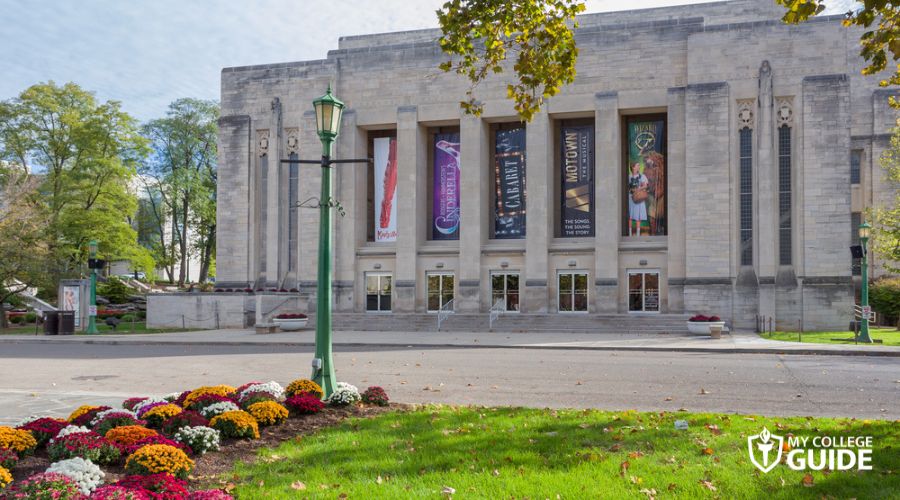
Accreditation is an important factor to consider when investigating Indiana universities and colleges online. Academic institutions with regional accreditation status have been evaluated by an accrediting organization in order to demonstrate that they provide quality education.
Many employers and graduate-level schools look more favorably at degrees from regionally accredited programs.
Editorial Listing ShortCode:
Regional accreditation is also important if you need to change schools before graduating. It is generally easier to transfer credits from these programs, which can help you avoid needing to repeat classes.
Financial Aid and Scholarships

If you are interested in pursuing a degree from an online university in Indiana, filling out the Free Application for Federal Student Aid (FAFSA) is often a good place to start.
The FAFSA helps to determine the amount of federal, state, and private financial aid you are eligible for. The ideal types of financial aid are grants and scholarships, which do not have to be paid back as long as they are used properly.
When attending online IN colleges, there are two grant programs that may be able to help:
- Frank O’Bannon Grant: Two awards are offered through this grant: the Higher Education Award and the Freedom of Choice Award. These are need-based awards, and the dollar amount given each year varies.
- The 21st Century Scholars: Sign-ups for this program happen in middle school. Members must pledge to achieve certain academic goals, avoid using drugs or being involved in illegal activities, and apply to eligible institutions. The aid provided is need-based.
The state of Indiana also offers financial aid programs to assist students in unique situations, including the Mitch Daniels Early Graduation Scholarship, the Adult Student Grant, and the Workforce Ready Grant. Programs for military, public safety officers, and future teachers are available as well.
There are also many scholarship opportunities to pursue. Scholarships may be offered for academic success, location, field of study, or other unique factors. Here are a few examples of scholarships available to qualifying Indiana residents:
- Indiana CPA Society Scholars Program: Provides year-long mentorship, business clothing, meals, limo rides to firms and businesses employing CPAs, an academic gift of $500, a CPA mentor, and a college or scholarship letter of recommendation
- Indiana Engineering Scholarships: $1,000 per year
- Medical Group Management Association (MGMA) Midwest Section Scholarships: Varies
It can be helpful to consult the financial aid office at the school you plan to attend as well. They can potentially tell you about financial aid resources you may not find elsewhere!
Indiana Online Education Resources

There are a number of valuable resources in Indiana that can help you make the transition into college. These are a few you may want to consider:
- Learn More Indiana: This site offers extensive financial aid information, including the Scholar Track portal, and guidance for choosing a college in Indiana.
- Indiana Commission for Higher Education: This website provides information about state-supported financial aid programs.
- Indiana Gear Up: This site provides information about bridge programs, tutoring, and support for math and science courses.
These sites can help simplify the search for online Indiana colleges and financial aid programs.
How Much Does It Cost to Go to an Online College in Indiana?

The cost of a college degree differs depending on how many credit hours the program requires, whether you are an in-state or out-of-state student, and what type of school you are attending.
For example, the cost of tuition and fees at a 4 year public institution is on average $9,656 a year, while a private school costs on average $48,211.
Editorial Listing ShortCode:
Students who are not residents of Indiana also have to pay additional charges on top of this base rate tuition. Part-time students attending online courses often pay per credit hour rather than a set amount of tuition.
Tuition Breaks for Out-of-State Students

Students who are not Indiana residents usually have to pay substantially higher tuition to attend online Indiana colleges, but there are opportunities for reduced tuition.
The Midwest Student Exchange Program is comprised of eight states, including Indiana. Participating schools charge lower tuition rates, up to 150% of in-state tuition, for qualifying students from partner states.
Kansas, Minnesota, Missouri, Nebraska, North Dakota, Ohio, and Wisconsin are currently a part of the Midwest Student Exchange Program, but not all schools choose to participate in the reciprocity program.
Some colleges waive out-of-state tuition entirely, particularly for online programs, and instead charge the same rate for all students regardless of their residential status. Although you may receive a discounted tuition rate, some online courses do require additional technology or connection fees.
How Long Does it Take to Get an Online Bachelors Degree in Indiana?

The amount of time it takes to complete online education programs in Indiana depends on several factors. If you are attending full-time and the college has a traditional, 16 week semester, you can most likely graduate within 4 years. It’s sometimes possible to graduate more quickly.
Editorial Listing ShortCode:
Some colleges offer condensed or accelerated online programs that can be completed in 3 years. Dual enrollment credits and summer classes also often shorten the degree completion time. Attending college part-time will extend your graduation timeline, potentially by 2 years or longer.
What Are the High Demand Jobs in Indiana?

Certain careers for college graduates in Indiana are growing at accelerated rates. According to the Indiana Department of Workforce Development, these are some of the most in-demand jobs:
- Registered nurses
- Software developers and software quality assurance analysts and testers
- General and operations managers
- Nurse practitioners
- Medical assistants
These positions correspond with some of the most popular online degrees, including business, nursing, and computer networking. Pursuing one of these degrees may place you in a strong position to take on a position in a growing field after you graduate.
What Are the Highest Paying Jobs in Indiana?
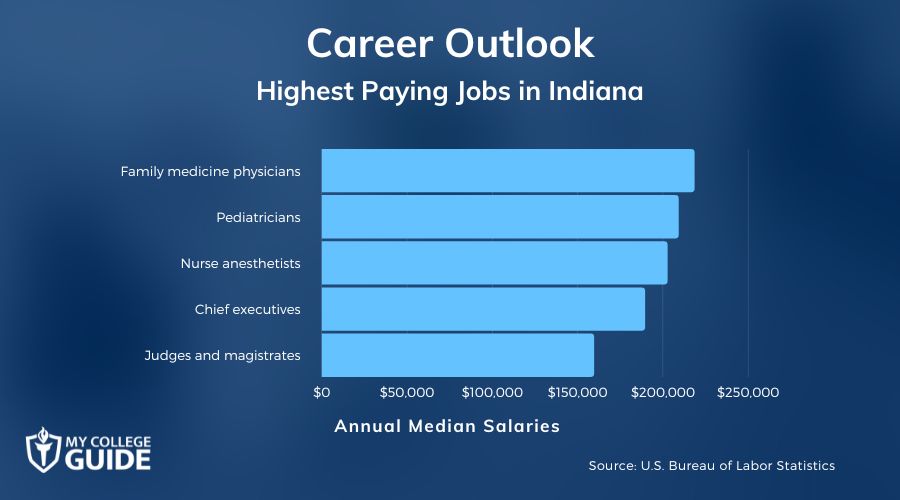
Many college students also look for career paths that will pay competitive salaries. According to the Bureau of Labor Statistics, these jobs have some of the highest median annual wages in Indiana:
- Family medicine physicians: $218,360
- Pediatricians: $209,060
- Nurse anesthetists: $202,550
- Chief executives: $189,380
- Judges, magistrate judges, and magistrates: $159,490
Your potential earnings ultimately depend on your location, professional experience, and employer. For example, you may earn significantly more as a chief executive in a large city rather than one at a small local company in a rural town.
List of Online Colleges in Indiana
Methodology: The following school list is in alphabetical order. To be included, a college or university must be regionally accredited and offer degree programs online or in a hybrid format.

The American College of Education is a fully online college designed for students who want to work in the field of education. All courses are asynchronous and either 5 or 10 weeks long. Programs have multiple start dates throughout the year.
The school offers bachelor’s, master’s, and doctorate degrees in fields like special education, literacy, and STEM education.
The American College of Education is accredited by the Higher Learning Commission of the North Central Association.

Ball State University offers over 100 online programs for students looking to further their education and careers. Students can choose between online or blended programs.
The program offers undergraduate, graduate, graduate certificate, and licensing programs. Fields of study offered include applied behavior analysis, economics, data science, interior design, and adult and community education.
Ball State University is accredited by the Higher Learning Commission.

Bethel University—Indiana’s online degree programs aim to provide students with a career-oriented education backed by the Christian faith. Classes are asynchronous, and most are fully online. Some require fieldwork. There are six start dates offered throughout the year. Classes are either 7 or 15 weeks long.
The school offers 18 online programs, including fields like Christian leadership and cyber security.
Bethel University – Indiana is accredited by the Higher Learning Commission.

Goshen College offers online degree programs for working adults who are ready to take their careers to the next level. The programs are designed to provide online students with the same quality of education as their on-campus counterparts.
Goshen currently offers three online degree programs: an RN to BSN in Nursing, a Master of Business Administration, and a Doctor of Nursing Practice.
Goshen College is accredited by the Higher Learning Commission.

Huntington University offers online undergraduate degree programs designed for adult learners and nontraditional students.
Students can earn an entire degree or complete a degree they’ve already started. The school offers online programs for an Associate in Organizational Management and a Certificate in TESOL and EL. HU offers online bachelor’s degree programs in business administration, marketing, psychology, and not-for-profit leadership.
Huntington University is accredited by the Higher Learning Commission.

Indiana Tech offers online undergraduate and graduate degree programs designed for nontraditional students. The school has been recognized for its support of military students. There are eight start dates offered throughout the year.
Undergraduate students can earn degrees in child development or graphic design. Graduate programs include studies in data analytics and global health leadership.
Indiana Tech is accredited by the Higher Learning Commission.

Online students at Indiana State University can start or finish a bachelor’s degree or enter a graduate program. Indiana State offers tutoring services to help online students succeed.
ISU offers bachelor’s degrees in fields of study like construction management or nursing. Graduate programs include biology and sport management.
Indiana State University is accredited by the Higher Learning Commission.
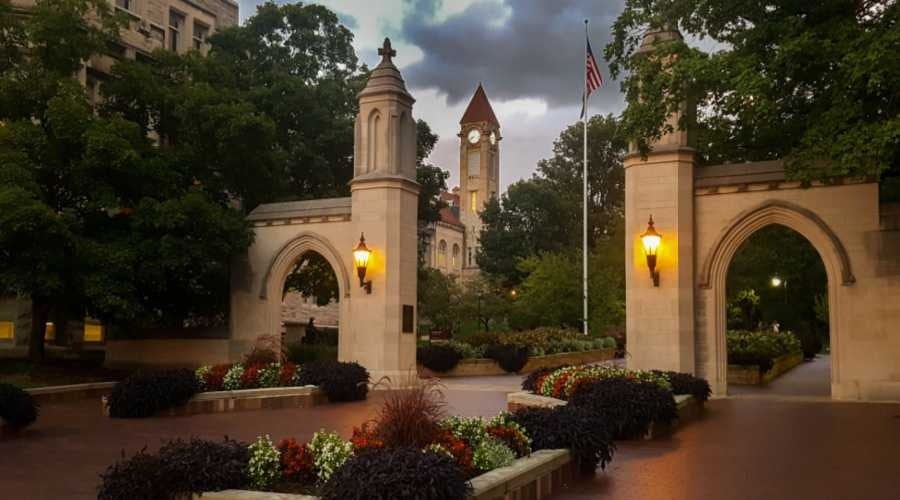
U.S. News & World Report recently ranked Indiana University—Bloomington’s business, education, and bachelor’s programs among the best in the nation. Some programs are fully online, while others require some time on campus.
The school offers over 200 undergraduate and graduate programs. Areas of study offered include sustainability studies, chemistry, human-computer interaction, and music therapy.
Indiana University – Bloomington is accredited by the Higher Learning Commission.

Newsweek named Indiana Wesleyan University one of America’s Top Online Colleges. The school offers over 160 online programs that are designed to provide the same quality education as their on-campus counterparts. Courses are asynchronous and completely online, and each one is 5 to 8 weeks long.
Indianan Wesleyan offers associate, bachelor’s, master’s, and doctoral degrees in fields like counseling, accounting, and ministry.
Indiana Wesleyan University is accredited by the Higher Learning Commission.

Marian University’s Adult Program (MAP) offers a Christian-centered online education designed for working adults. Courses are offered entirely online, with opportunities for internships and community work.
The program offers associate and bachelor’s degrees. Courses are 5 to 8 weeks long, and there are nine start dates throughout the year. Programs of study include an accelerated RN-to-BSN and paralegal studies.
Marian University is accredited by the Higher Learning Commission of the North Central Association.

Oakland City University offers associate, bachelor’s, and master’s degrees that can be earned online. Prospective students can apply for free, and GRE scores are not needed to apply. Classes meet online once a week in the evenings. Each class is 5 to 8 weeks long. Fields of study offered include marketing and leadership.
Oakland City University is accredited by the Higher Learning Commission.

Purdue University’s online learning system offers over 200 programs designed to help nontraditional learners earn degrees and advance in their careers.
Completely online and hybrid programs are offered. Some courses have synchronous components. The school offers programs for associate, bachelor’s, master’s, and doctorate degrees in fields of study like sociology, engineering, and nursing.
Purdue University is accredited by the Higher Learning Commission of the North Central Association of Colleges and Schools.

Saint Mary-of-the-Woods College has been providing students with distance learning options for over 40 years. The school offers completely online programs and hybrid programs. It’s free to apply. Students may be able to transfer credits or earn credits through a Prior Learning Assessment.
Associate, bachelor’s, and master’s degrees are available in fields like criminology and art therapy.
Saint Mary-of-the-Woods College is accredited by the Higher Learning Commission.

Trine University aims to support its online students so that they can be successful in their education. It helps students figure out transfer credits, provides scheduling advice, and offers tutoring. New classes start every 8 weeks, and many textbooks are free.
Trine offers associate, bachelor’s, and master’s degrees online in over 20 programs. Fields of study offered include engineering, healthcare, leadership, business, and justice.
Trine University is accredited by the Higher Learning Commission.
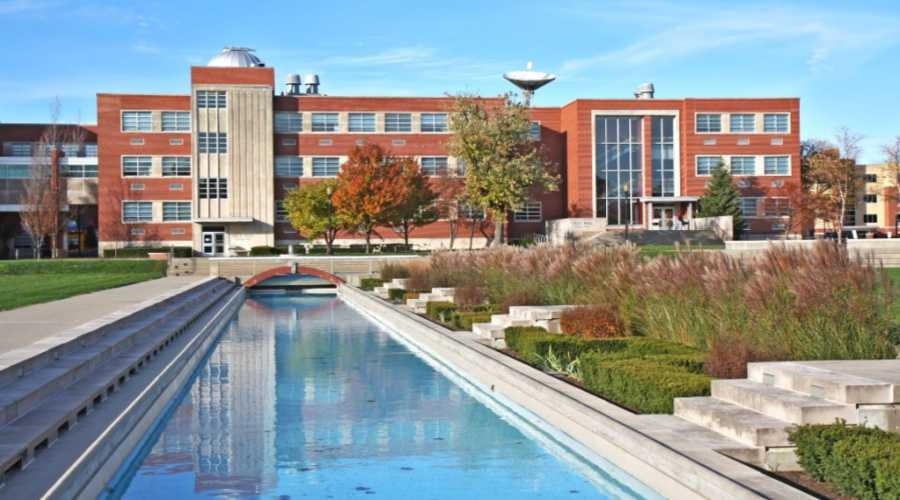
The University of Indianapolis offers online degree programs designed for nontraditional students and working adults looking to further their careers. Most courses are fully online, while some are in a hybrid format. Some require local fieldwork.
Undergraduate students can earn an accelerated BSN. Graduate students can choose between seven masters and three doctorates, in fields such as aging studies and management.
The University of Indianapolis is accredited by the Higher Learning Commission.

The University of Notre Dame offers one online degree, an MS in Data Science. The program is taught by teachers from the mathematics and business departments and industry leaders.
The program is fully online and offers the chance for collaboration. There are multiple start dates offered each year. The curriculum consists of courses like Big Data and Linear Models.
The University of Notre Dame is accredited by the Higher Learning Commission.

The University of Saint Francis offers career-driven online degree programs, many of which can potentially be completed in just 1 year. Small online classes and dedicated success coaches help to ensure success.
Saint Francis offers 11 online programs. Most are for master’s degrees, but there are a few certificates offered. Fields of study offered include healthcare administration, online teaching, and management science.
The University of Saint Francis is accredited by the Higher Learning Commission.

The University of Southern Indiana’s online learning program provides flexible scheduling and many asynchronous programs designed for nontraditional and adult learners. The programs are 100% online, and most offer several start dates each year and 7 week classes.
The school offers bachelor’s, master’s, and doctorate degrees in fields like sport management, liberal studies, education, and radiologic technology.
The University of Southern Indiana is accredited by the Higher Learning Commission.

Valparaiso University offers a limited number of online programs. Some programs are almost entirely online, while a few are offered in a hybrid format.
Online students can earn an MS in Cyber Security, an OTD in Occupational Therapy, or a BS, an MS, or a DNP in Nursing. Nursing programs require on-campus time along with online work.
Valparaiso University is accredited by the Higher Learning Commission.

Vincennes University offers several online programs. While some programs are fully online, others require time on campus or a practicum experience. Classes are 8 to 12 weeks long and have several start dates throughout the year.
Vincennes offers associate and bachelor’s degrees in fields like technology or behavioral sciences.
Vincennes University is accredited by the Higher Learning Commission.
Getting Your Online Degree in Indiana

Indiana is extremely dedicated to providing a quality higher education system in the country. The state continues to challenge its top-notch colleges and universities to improve, including offering more and more Indiana online universities.
It supports students by offering numerous grant and scholarship opportunities. and it has a long history of being at the forefront when it comes to distance and online learning.
To jump-start your journey, you can begin researching Indiana online colleges and make a list of those that offer your chosen degree path.
You can also view our Online Colleges in Illinois and Online Colleges in Iowa guides for more options.
